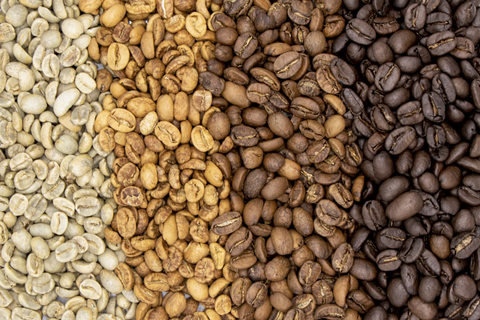We start from the assumption that there are no specific and strict rules in the world of coffee, there are styles, trends and / or useful tips which, if applied throughout the supply chain, can give a benefit to the drink.
What are called "rules" are in practice suggestions based on experience, study and research, but we know that coffee is a living raw material and cannot be channeled into a narrow range that applies to everyone.
After this preamble, in these lines we will see how the color of the Toasting then affects the final drink (positive and negative).
Definition of Color:
The color that the coffee bean takes on during the roasting cycle thanks to the pigments present and the action of heat on the bean itself. In practice, chemical reactions occur during roasting as an effect of the application of heat for cooking (a bit like what happens to all foods when they are cooked) which are classified with the name of Maillard reaction (or caramelization, which is the effect). Generally sugars are caramelized (complex such as carbohydrates, or simple such as sucrose, fructose, glucose, maltose, etc.), pigmentation affects some substances present in coffee such as tannins, in the third part of the Maillard reaction the Melanoidins are formed , also with a brown color. Coffee behaves a bit like biscuits in the oven, once I put it in the oven and start heating them, they slowly begin to color, first of a yellowish color and then switch to an intense yellow color, turning towards a light brown. until it turns dark brown. If we continued to apply heat, the result would be a total coloring towards black (when for example we forget the cookies in the oven and we only remember them when we have a smoke-filled kitchen and they are now burnt and to be thrown away).

What changes in coffee during all these shades of brown?
Coffee needs to cook, it doesn't rain on this, but the level of color we reach is the key to defining its flavor and many other things. From raw (it has a color ranging from blue to brown passing towards green and yellowish) coffee has a content of substances that potentially give acidity, sweetness, aromas and body to the drink, however these substances need to "express themselves" ( when raw they do not). To do this, they must overcome certain temperatures and certain phases during roasting, until they are “matured” or created by pyrolysis (melting thanks to heat) and ready to be then extracted into the cup. On the contrary, however, even an exaggerated application of heat both in quantity and in terms of time, causes negative effects, the decomposition and subsequent destruction of these "good" substances, to the point of creating other substances that have a negative taste and taste (burnt, smoke, …)
So what's the right color?
Impossible to establish with absolute certainty in a rule that is applicable to all coffees in the world. Too many variables in the raw material (coffee beans from Colombia, or Indonesia, or Kenya ...?) Or based on local cultures (we are in Norway, China, United States, Italy, Spain ...?), But also based on different types of extraction, Espresso and filter, for example, have very different contact times between coffee and water, which is why they need different roasting methods.
Conclusion:
We can say with certainty that too much is good, in both senses, that it is too light or too dark is always negative. But be careful to base your choices (before tasting the coffee) solely and exclusively on the color, it is not the only thing that can negatively or positively affect the coffee you are going to drink. What to do now? Now you know what to look for, on our shop you can find all
single origins Specialty Toasted Light or Medium for every need.






